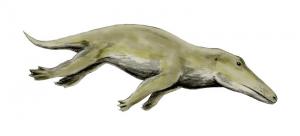 Ambulocetus: a transitional whale. Image from WikiCommons Summary of problems with claim: In reality, all paleontology experts agree that Pakicetus, Ambulocetus, and other famous "whales with legs" fossils are classic cases of fossils with transitional morphology. The people who disagree are Discovery Institute fellows and other creationists.
Ambulocetus: a transitional whale. Image from WikiCommons Summary of problems with claim: In reality, all paleontology experts agree that Pakicetus, Ambulocetus, and other famous "whales with legs" fossils are classic cases of fossils with transitional morphology. The people who disagree are Discovery Institute fellows and other creationists.
Full discussion: This is another example of the authors of Explore Evolution exploiting the vagueness of the phrase "some scientists." Here, they make it appear as if a creationist position (no fossils illustrating the transition between walking mammals and whales) has significant scientific support.
Recently, some scientists think they have discovered a transitional fossil sequence connecting land dwelling mammals to whales.Explore Evolution, p. 20
The authors neglect to mention that the terrestrial forebears of whales were correctly hypothesized in the 1800's. In the 1980's, a compelling fossil sequence for whale evolution was put forth and since then, the fossil sequence has grown to dozens of intermediates. Anyone familiar with scientific literature on this topic knows that the fossils of "whales with legs" are famous throughout evolutionary biology, are the subject of dozens of papers in top journals like Science, used in many textbooks, and have been covered by numerous science journalists. There is no scientific opposition to the idea that these fossils show transitional morphology.
For a review of the walking-mammal to whale transition, see:
- Kevin Padian's testimony on whale evolution in Kitzmiller v. Dover
- The whale evolution pages of researchers Hans Thewissen and Philip Gingerich
- The Origin of Whales and the Power of Independent Evidence
- PBS Whale Evolution video
It is interesting to compare the treatment of whale fossils in Explore Evolution with the treatment of whale fossils in its creationist ancestors. Creationist Duane Gish wrote:
The marine mammals abruptly appear in the fossil record as whales, dolphins, sea-cows, etc. There simply are no transitional forms in the fossil record between the marine mammals and their supposed land mammal ancestors.Duane Gish (1992)Evolution: The Challenge of the Fossil Record. Creation-Life Publishers: El Cajon, CA. p. 79
In Evolution: A Theory in Crisis Michael Denton spends several pages commenting on what he believed to be the unfortunate necessity of having:
to postulate a large number of entirely extinct hypothetical species starting from a small, relatively unspecialized land mammal and leading successively through an otter-like state, seal-like stage, sirenian-like stage and finally to a putative organism which could serve as the ancestor of the modern whales. Even from the hypothetical whale ancestor stage we need to postulate many hypothetical primitive whales to bridge the not inconsiderable gaps which separate the modern filter feeders (baleen whales) and the toothed whales.Denton (1985) Evolution: A Theory in CrisisAdler & Adler Publishers:Chevy Chase, MD. p. 174
In his next book, published in 1998 (after the fossils described above where discovered), whale fossils were no longer a subject of discussion. Likewise, the authors of Explore Evolution, rather than celebrating the growth of scientific knowledge, stir up confusion around it. Needless to say, this approach is neither inquiry-based nor scientific, and sows confusion where a textbook should educate and inspire.
